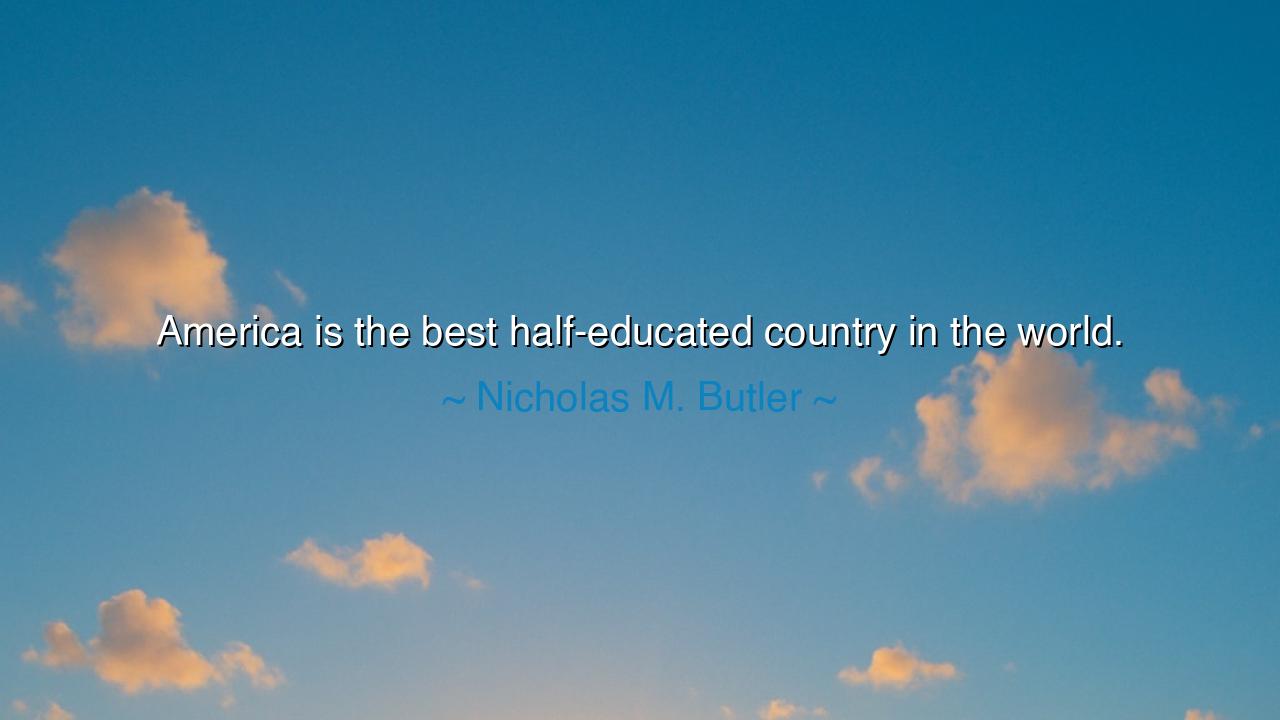
America is the best half-educated country in the world.






There is both irony and reverence in the words of Nicholas M. Butler, the American philosopher, educator, and Nobel laureate, when he declared: “America is the best half-educated country in the world.” These words, though brief, strike like a bell — resonating with both pride and warning. Butler, who led Columbia University through the turbulent dawn of the twentieth century, spoke as a man who had witnessed the rise of a powerful nation — energetic, inventive, and ambitious — yet often too content with superficial understanding. His observation was not an insult, but a lament wrapped in admiration: he saw in America a people bursting with opportunity and vigor, yet unwilling to carry their education to its deepest fulfillment.
To be half-educated, in Butler’s sense, is not merely to lack schooling. It is to have learned the forms of knowledge without mastering its spirit — to possess information but not wisdom, to wield tools without understanding their moral weight. America, he observed, was filled with restless intelligence: its citizens read newspapers, debated politics, founded universities, and built industries. Yet beneath this brilliance lay a certain impatience — a tendency to rush toward progress without reflection, to favor action over contemplation. The nation’s genius, though undeniable, was often unanchored by philosophy. Thus, America became the “best” of the half-educated: unrivaled in energy, but still maturing in wisdom.
Nicholas M. Butler, who lived from 1862 to 1947, was not only a scholar but also a moralist. He believed education was the foundation of civilization — not merely as a means to employment, but as a sacred discipline that trained both intellect and character. His remark arose during a time when America was ascendant — when its wealth, inventions, and universities dazzled the world. Yet Butler, like the prophets of old, saw the shadow behind the light. He recognized that the power of a nation built on partial understanding could just as easily lead to arrogance as to enlightenment. His warning was clear: knowledge without depth breeds pride without purpose.
History offers countless confirmations of his insight. Consider the early decades of the twentieth century, when rapid industrialization and scientific discovery filled the world with new wonders — electricity, automobiles, flight, radio. Yet these same advances, when used without wisdom, produced new forms of exploitation and warfare. The same educated hands that built the airplane also built the bomb. The same cleverness that invented mass production also learned to manipulate mass opinion. America, in Butler’s eyes, was a land of extraordinary mind but insufficient meditation — a place where invention raced ahead of moral reflection.
But this is not to scorn America; indeed, Butler’s tone carries both affection and hope. To be “the best half-educated country” means to hold within oneself the potential for greatness still unrealized. The phrase “best” implies possibility — that America’s partial education was a beginning, not a failure. The soil was rich, the spirit was strong; what remained was the cultivation of depth, humility, and understanding. Butler believed that with greater devotion to truth and character, the half-educated nation could become fully enlightened — a beacon not only of industry, but of wisdom.
In a deeper sense, Butler’s quote speaks not only of a nation but of all humanity. Every person, in some way, is half-educated — knowing much, but understanding little. We memorize facts but forget meaning; we learn to speak but not to listen; we master the world but lose mastery of ourselves. True education, as the ancients taught, is not the filling of the mind, but the shaping of the soul. It teaches patience, humility, and reverence for truth. Without these, learning becomes vanity — a mirror that reflects brilliance but hides blindness.
Thus, let this be the teaching for those who seek wisdom: do not be content with half-knowledge. Learn deeply, and then reflect. Question not only what is, but why it is. Seek not only skill, but virtue. Build not only your career, but your conscience. The wise do not race to know everything; they linger to understand something fully. And as Butler foresaw, the strength of any nation — or soul — depends not on how much it knows, but on how deeply it understands what it knows.
So remember this truth, passed down like a torch: to be half-educated is to stand on the edge of greatness, but also on the brink of folly. The challenge of every generation — and of every person — is to cross that threshold. Let knowledge ripen into wisdom, let power be tempered by reflection, and let education serve not the ego, but the good. Then, and only then, will a people rise from being half-educated to being wholly enlightened — not just the best, but the wisest in the world.






AAdministratorAdministrator
Welcome, honored guests. Please leave a comment, we will respond soon